 McGOWAN, WILLIAM
McGOWAN, WILLIAM
(July 07, 1838 — April 06, 1881)
Ship’s Master.
At the maritime forefront during years of massacres and unrest, bankruptcy, upheaval and jousting for supremacy by Chiefs Maafu and Cakobau.
By Robyn Mortimer
![]()
William McGowan, ship’s captain operating out of Levuka in 1871, was born on the 7th of July, 1838 in the town of Ayr, in south west Scotland. I found only the one William McGowan born in that year, in that place, and he was the son of Captain William McGowan, ship’s master, and an English woman, Susan Hunter.
Geraldine Sweeny, born in Worthing, Sussex in 1849 sailed to Australia with her sisters in 1868 and it is probable she first met William there in Victoria and bore him, out of marriage, a son, Alfred James. It would be a few years before they again meet, in Levuka on the island of Ovalau.
Back in Scotland, William by 1851 is 13 years of age and according to Merchant Seamen records already apprenticed to the sea as a ship’s boy. The young lad is obviously at ease with life on the high sea, you could say he was a chip off the old block; within five years at the age of 19 he is issued with a UK and Ireland Masters and Mates Certificate.
Years pass before his name pops up again this time in the Otago, New Zealand Police Gazette reporting him as deserting ship, a common occurrence at the time when the discovery of gold in both New Zealand and Australia was luring sailors in their thousands to abandon ship.
Merchant ship Winged Arrow, sought for desertion at Port Chalmers, 11.12.1861, second Mate Peter Murdoch and four others:- John Brown, 27, William McGowan 27, Andrew Powell 25 and John Welch 21.
The age doesn’t precisely match but records were hand written and rarely, if ever, checked against official registers. The Winged Arrow had at that precise time arrived in NZ with a cargo of Leicester sheep from Glasgow in Scotland.
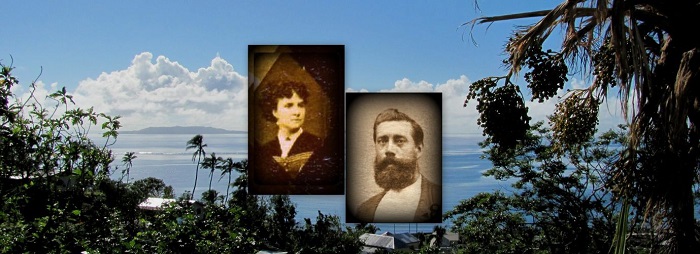
The earliest mention of McGowan in Fiji appears in the shipping summary of the New Zealand Herald dated October 1870 when he is listed as the Master of the cutter Aquilla arriving in Auckland from Fiji. The ship clears port for the return trip on November 23rd carrying a cargo of building materials, a case of mustard, ale and 2 cases of wine, but with no mention of its skipper.
He next appears in the Shipping Intelligence of the Fiji Times for October 3rd 1871 when the vessel Mabel, a fast cutter of 20 tons is listed arriving in Levuka Harbour from the outer islands of the Yasawas under its Master, William McGowan. The same ship leaves next day on the return voyage to the Yasawas but with a different captain. In ensuing years William commands a variety of vessels all within the Fiji, Tonga, Samoa locale.
Of Great-Grandmother Geraldine, presumably still in Australia in the year 1871, and even perhaps in 1872, there is only silence: Apart from bearing a son in Ballarat we have no idea of her whereabouts until she suddenly turns up in Fiji.
It seems William has been long enough in Levuka to acquire property, one on which he pays the local council the required rates. In the Saturday November 2nd 1872 edition of the local paper a list of 70 ratepayers, including W. McGowan have, in a public petition called on His Worship the Mayor of Levuka to resign without further delay in order that new elections may be proceeded with and necessary township works may be carried out.
His property at the time could very well be the small single storey sail making shop on the esplanade frontage with living quarters in the rear which in later years was known to be owned at different times by William McGowan Senior and by Geraldine’s second husband Robert Foreman. (Around the turn of the century the shop’s signage will then revert back to McGowans with business conducted by a newly married son, Alfred McGowan.) The building still stands, the McGowan name printed clearly on the frontage.
Wednesday December 11th 1872, the Marie Louise is in harbour, and just a month after that, January 1873 William McGowan is mentioned as the master aboard the same ship sailing between the islands of Taveuni and Koro.
In this calendar year of 1872 no less than eight voyages to outlying islands are listed for the Government owned vessel, the Flying Cloud under the command of William McGowan. On each occasion his cargo comprises labourers destined to work in the outlying Yasawas… many of these native labourers have been kidnapped from their homes in the New Hebrides or even bartered from outlying villages in Fiji itself. The practice becomes known as blackbirding.
There is money to be made for the owners of these boats, not all of them European, some are owned by prominent native chiefs, with this island trade consisting of not only male labourers but women and children as well. Prime quality males for instance sell for £15 each. (Though later I read a figure of £30.) Such is this widespread trade in slave labour it is only a matter of time before rebellion spreads like wildfire through the many tribal settlements and islands.
The first official hint that my great Grandmother has actually arrived in Fiji and indeed has made her presence felt is made in an official notation scribbled on the back of a letter by an official in Fiji’s then Government.
The date of this missive is February 1873; William McGowan, Master of the Government schooner Marie Louise has been delayed returning from the Yasawas, a group of outer islands to the north of Viti Levu, where he has deposited a cargo of labourers, and duly advises his superiors of this in a handwritten letter.
The letter addressed to Fiji’s Deputy Attorney General, is supposedly written by William, yet the writing appears to be in a woman’s hand, it has a distinctly feminine flow.
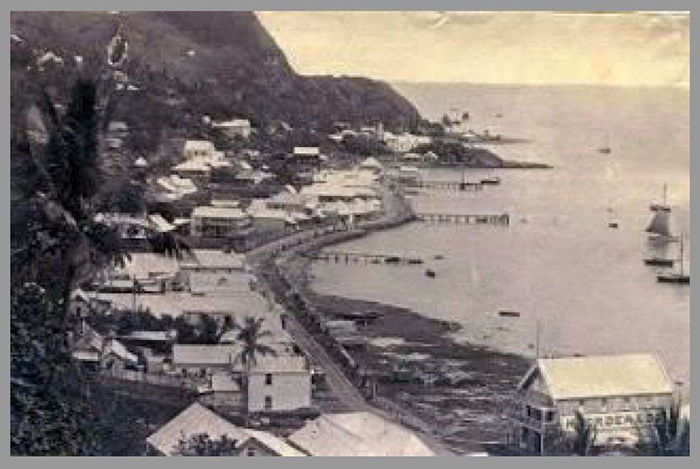
Williams time.with the weatherboard shop still there in 2018.
According to a letter written in Feb 1873 by William to his superior, the Minister for Native Affairs in the Cakobau Government, we find he is the master of a 30 ton island trading ketch, the Marie Louise previously based in Tasmania, but later wrecked on an outer Fiji reef, rebuilt and sold to a Fiji chief. Explaining his late return to port William writes in his letter … ‘we were detained five days longer through stress of weather’.
The letter is received by the acting Attorney General, Captain Harding who scrawls on the back of the page…
‘What’s to be done, the vessels not in harbour and the woman is aboard.’
Written in darker ink across this note is the reply…
‘Chief Secretary says wait till he’s seen the Atty General.’
I immediately wonder if the woman is Geraldine, the woman he would marry. I even suspect she has written the letter herself, the hand writing has a distinct feminine touch, and the author is obviously well educated… as Geraldine certainly had been. (Many years later comparing her signature to a later government document indicates both missives were written by her hand)
The Attorney General’s curt reference to ‘the woman’ is in itself questionable. She has not been given a title, Mrs or Miss, which makes me wonder if at that stage William and Geraldine are living together possibly on the boat but not legally as man and wife.

A further development surrounding the Marie Louise affair, occurs when William McGowan appears in Fiji’s Central Provincial Court to argue his claim for unpaid wages. The claim dates from the earlier receipt of the oddly notated letter dated February 1873 apparently penned by Geraldine.
On Tuesday 14 April 1874 at the Central Provincial Court a civil case, William McGowan v J B Thurston, was heard before the Warden, Mr N Chalmers, and Ratu Meli, J’s P.
McGowan was represented by Mr Solomon and the defendant by Mr Murray. McGowan claimed wages due to him whilst captain of the Marie Louise in the sum of £22 10s. McGowan produced for the court his letter of appointment as commander of that vessel.
John Bates Thurston argued that he (Thurston) was only acting pro tem whilst the permanent officer, Mr Woods, was away in the colonies, and that the latter had conducted all the business with McGowan. It was shown that McGowan had received wages from the Government Treasury from February to the end of June (presumably of 1873), and so he lost the case.
It’s not surprising my great Grandfather loses his claim, by this time Fiji is virtually bankrupt and the government officer Woods on the dates in question was indeed away in Australia trying desperately to prop up Fiji’s coffers. Even had McGowan won the case there would have been no funds to cover any settlement.
But as events will prove Woods is flogging a political dead horse because Mr J.B. Thurston at the very same time was endeavouring to persuade Queen Victoria and her Government to save the day and the country by first settling the colony’s huge debt to America and then taking over total legal and economic responsibility for Fiji.
A year later, in 1874 William purchases from Peter Whippy a 2 acre block of land on the island of Kadavu. He pays forty pounds for the block which fronts the ocean at Angalore and surprisingly he signs the necessary forms with an X. Within a year, as shown in the 1875 census of Fiji, Mr and Mrs McGowan and their two sons are listed as residents of Kadavu.
Over the years the McGowan’s bring into the world four sons and two daughters. But going by the dates on their children’s birth certificates even Geraldine seems unsure of just when she and William married. We do know a ceremony was performed sometime prior to 1875 by the Rev John Robson on the island of Kadavu just four days sail from Levuka; but the marriage was not registered in Levuka until late 1875 by the Wesleyan minister Rev. Webb.
John Robson was resident on Kadavu, as were the McGowan’s with their two children at the time of Fiji’s 1875 census. Birth and marriage details were often months and even years old before being officially lodged in Levuka and dates given on official reports could be misleading. We can only go on the birth and much later marriage certificates of three McGowan children, each one showing conflicting dates.
Maggie, my grandmother, for instance was born in 1877 and her birth certificate lists her parents marriage in Levuka as 1871. Two years later her younger brother Andrew has a certificate that states they were married on Kadavu in 1874. Then in 1881 Constance is born, a still birth, and this time the certificate states they were married in 1872 in Kadavu. Years later Gordon and William Jnr wedding certificates are even more confusing regarding their own birth dates but the most puzzling aspect of all is that there appears to be no official records at all for Alfred James McGowan.
My great grandparents early days in Fiji coincided with the difficult times of early European style Government, charlatans in power, massacres and unrest, bankruptcy and jousting for supremacy by both Maafu and Cakobau and the ultimate take over by the British Government. William McGowan was at the maritime forefront during these years of upheaval, employed to sail various government vessels on official business whether it be carrying supplies or workers to outer islands, or transporting police and soldiers to military flashpoints on other islands.
William and Alfred the two oldest boys are listed as foundation pupils of Levuka’s first public school established in 1879. Unfortunately we don’t know which one is the eldest, William or Alfred; Gordon, Maggie, Andrew and baby Constance follow.
By the year of my grandmother Maggie’s birth in 1877 the McGowans have moved from Kadavu back to Levuka living in a house Geraldine has named Worthing Cottage. William is still trading back and forth through the islands of Fiji. Two years later Andrew, their last son will be born. William and Geraldine have only a little time left to be together; only a few short years to enjoy their family, to sail the sparkling seas around Fiji, to gather precious memories.
1881 – By now Geraldine and William are looking ahead to the birth of a new addition to their family. With little Maggie the only daughter in the family of five it goes without question they are hoping for another little girl.
Levuka is recovering not only from the big blow of December past, but of another destructive hurricane that hit Levuka early in February destroying several houses and damaging the school. Two boats sunk at their moorings and countless smaller craft left floating bottom upwards in the harbour. The much larger supply ship Gunga had been forced to keep up steam throughout the night while the storm lasted, with both anchors down. It was reported the vessel slipped one chain cable, and left one anchor behind when she started for Sydney the morning after the storm.
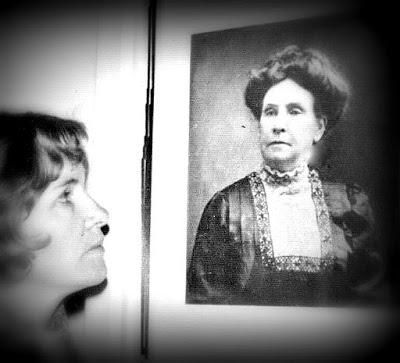
6th April 1881. In the McGowan home there was always the joy of their father’s return from the sea. Children eagerly scanning the horizon searching for familiar sails, three small boys arguing the boats expected time of arrival; a small sister and an even smaller brother trying to understand the keen sense of anticipation enveloping the household…
And Geraldine, accustomed by now to the constant separation, perhaps planning the evening meal to include his favourite choice of fare. Children or native helpers would have alerted her to the Coral Queen’s arrival…duly acknowledged with a smile and a soft sigh of relief. She knew the routine well. His arrival in port, the ship tying up at the wharf, the unloading of cargo, the dispersal of crew, Williams short walk to the agent’s office to deposit the records of lading.
Geraldine knew to the minute how long this would take, and she could estimate almost to the second when he would walk through the door, sweep her and the children into his arms, the sailor home from the sea. The family together again.
The McGowan saga should have continued like this for years to come. Geraldine and William ending their days with greying hair and fond memories, surrounded by numerous grandchildren.
But they didn’t. Their life together, Geraldine and William, ended on that day, 6th April 1881. Newspaper articles sourced from New Zealand’s Papers Past archive reports Captain McGowan’s death. In a modest way you could say these short paragraphs were my great-grandfather’s epitaph. An acknowledgment of his service to both country and family. William’s death as reported (some weeks after the event) first in the New Zealand Herald, and the following day in the Auckland Star…
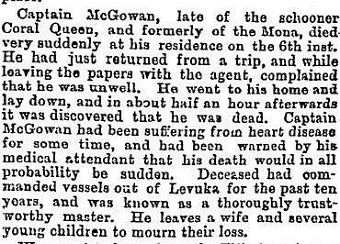 Those two brief news items speak a volume: A sick but determined man, a heart problem that could strike at any moment. He might well have succumbed to the disease at sea, or while supervising the discharge of his cargo, even while taking his leave of the company agent: But on that particular day William McGowan had only one thought in mind, to reach his home, his wife and his children.
Those two brief news items speak a volume: A sick but determined man, a heart problem that could strike at any moment. He might well have succumbed to the disease at sea, or while supervising the discharge of his cargo, even while taking his leave of the company agent: But on that particular day William McGowan had only one thought in mind, to reach his home, his wife and his children.
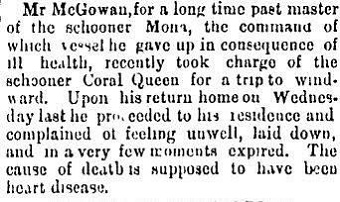 For Geraldine the end result may have been long dreaded, together the two mulling over the doctor’s earlier prognosis; like so many of us they may have pushed the thought of imminent death to the back of their minds. But assuming all this, and knowing now that a doctor had issued such a warning, I wonder why husband and wife failed to put their affairs in order. I present this aspect with a researcher’s gift of hindsight: It will however have a great bearing on Geraldine and her children’s future.
For Geraldine the end result may have been long dreaded, together the two mulling over the doctor’s earlier prognosis; like so many of us they may have pushed the thought of imminent death to the back of their minds. But assuming all this, and knowing now that a doctor had issued such a warning, I wonder why husband and wife failed to put their affairs in order. I present this aspect with a researcher’s gift of hindsight: It will however have a great bearing on Geraldine and her children’s future.
Deep in mourning, with her young family to care for and console Geraldine now faces a difficult and insecure future. Four months pregnant with their sixth child, Geraldine suddenly finds she has no legal rights to her deceased husband’s estate.
As she battles Fiji’s legal system, tries to comfort her small children and at the same time prepare for the birth of her sixth child she soon finds her life has become a nightmare of gigantic proportions.
Some few months later baby Constance is still born. Geraldine and her family are in shock and virtually destitute, dependent on others. She will take counsel from old friends, and will view her options. Finally some months later in Levuka Geraldine McGowan will marry a Scots sailmaker, Robert Foreman and together they will raise the McGowan youngsters and bring into the world yet another family of young Foreman’s.
To this day the McGowan name lives on in Fiji, their numerous offspring testament to a canny Scots sailor and his determined English wife, I feel sure both William and Geraldine would have been proud of each and every one of them.
![]()
Entry By: Robyn Mortimer, 139 Rainbow Crescent, Dunwich Qld 4183
Email: robynmortimer6@gmail.com.
More stories on the McGowans from Robyn Mortimer…
My great Grandparents were Geraldine and William McGowan, their Levuka history goes back to 1872. I’ve written numerous stories about them and their life there as blogs with Google Blogs. Links to most of the stories are:-
FIJI SERIES – THE MCGOWANS IN LEVUKA 1870 TO 1880
http://rainbowrobstravels.blogspot.com.au/2013/01/geraldines-two-husbands-part-one.html
http://rainbowrobstravels.blogspot.com.au/2013/01/when-life-needs-crystal-ball.html
http://rainbowrobstravels.blogspot.com.au/2013/02/1880-pt-3-clock-winds-down.html
http://rainbowrobstravels.blogspot.com.au/2013/02/1881-pt-4-love-affair-ends.html
http://rainbowrobstravels.blogspot.com.au/2013/02/1881-pt-5-life-becomes-nightmare.html
THE VESSEL MARIE LOUISE PT 1 http://rainbowrobstravels.blogspot.com.au/2012/03/fiji-1870s-pt-1-marie-louise-hobart-to.html
THE VESSEL MARIE LOUISE PT 2 http://rainbowrobstravels.blogspot.com.au/2012/03/fiji-1870s-pt-2-discord-aboard-marie.html
THE VESSEL MARIE LOUISE PT 3 http://rainbowrobstravels.blogspot.com.au/2012/03/fiji-1870s-pt-3-dodgy-dealings-aboard.html
